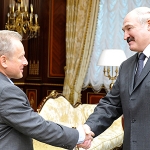Background
Grigory Ioffe was born on October 21, 1951 in Moscow City, into the family of Victor and Raisa Ioffe. He later became a naturalized U.S. citizen.

Grigory Ioffe was born on October 21, 1951 in Moscow City, into the family of Victor and Raisa Ioffe. He later became a naturalized U.S. citizen.
Grigory Ioffe studied at the Moscow State University where he received a Master of Arts in 1974. After that he earned a Doctor of Philosophy at U.S.S.R. Academy of Sciences in 1980.
Grigory started his academic career in 1974 as a junior research associate at the Institute for Rural Construction Planning. In three years he took the position of a senior research associate. Until his emigration to the United States, Grigory worked at the U.S.S.R. Academy of Sciences as a junior research associate at Institute of Geography, senior research associate, and a department head.
In 1989, Grigory immigrated to the United States with his wife, Yelena, and his children, Michael and Natasha. Lynn, Massachusetts was their gateway community, but Radford University in Radford, Virginia has been his only place of work in America. In 1995, his family and he proudly became US citizens. He is indebted to many fellow Americans, particularly to George Demko of Dartmouth College (his most lasting American friend and mentor) and to several colleagues and friends from Radford - Glenn Embrey, Nat Kranowski, Bernd Kuennecke, Lori LeMay, Don Samson, and Susan Woodward.
Currently, Grigory Ioffe works in Virginia as a professor of geography at Radford University. Some courses he has taught over the past 19 years include World Regional Geography, Economic Geography, Population Geography, Geography of Europe, and Geography of the Middle East.
He is well traveled in the former Soviet Union. Grigory Ioffe has visited 13 out of 15 of its former republics and many regions of Russia from Kaliningrad in the west to Chukotka in the east and from Chechnya and N. Ossetia in the south to Murmansk in the north. He spent months in field trips in the outlying rural areas of Central Russia, where the sense of remoteness induced by poor roads and general neglect belies these areas' proximity (100-150 km) to major urban clusters. He is also well traveled in Europe where he visited 22 countries and he lived and worked in some of them for weeks and months at a time.
Grigory Ioffe's major completed research projects are A Troubled Realm: Russian Agriculture's Spatial Constraints, Variance, and Prospects for Revival, funded by the National Science Foundation, and Understanding Belarus, a project for which he did not receive major funding and yet published a book and several articles. His paper "Culture wars, Soul-Searching, and Belarusian Identity", presented at the symposium "The Arts, National Identity and Politics in Belarus", reflects some of his Belarus project’s major findings.

Grigory Ioffe is highly famous as the author of books "Continuity and Change in Rural Russia", "Applications of the Factor Analysis in Physical Planning: Guidelines for Planners", "Territorial Organization of the Economy as a Development Factor", and "Territorial Structure of the Economy in the Regions of Old Colonization."
(What are the factors of Lukashenka's longevity at the hel...)
2014(Treats the new and rapidly developing independent field i...)
1984(Contrary to the viewpoint of many Western scholars, the a...)
1997(Our Global Studies Series provides students with comprehe...)
2010
Grigory Ioffe married Yelena Kulagina on May 12, 1979. They have two children - Mikhail and Nataliya.